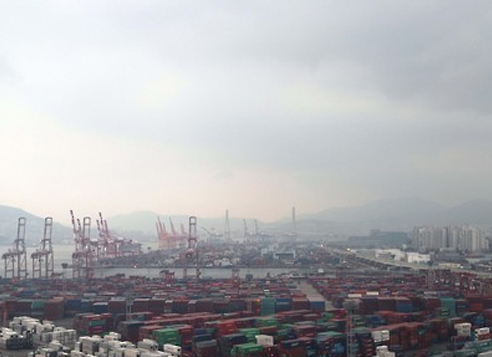Debate is heating up here on whether and how to reshape the government’s trade bodies to cope with mounting external pressures.
During his campaign, President Moon Jae-in vowed to transfer the trade functions of the Ministry of Trade, Industry and Energy to the Ministry of Foreign Affairs.
During his campaign, President Moon Jae-in vowed to transfer the trade functions of the Ministry of Trade, Industry and Energy to the Ministry of Foreign Affairs.

He said the decision by his predecessor Park Geun-hye to remove trade functions from the Foreign Ministry was “wrong,” siding with the view that the measure weakened the country’s ability to deal with pending trade issues.
Detailed plans on the reorganization are expected to be worked out by a presidential advisory commission launched Monday for a 70-day mission to draw up the key policy agenda and organizational chart of the administration led by Moon, who took office on May 10.
Some observers raise the possibility that, depending on the results of the commission’s review, an independent body like the US Trade Representative’s office will be formed or trade matters will continue to be overseen by the Industry Ministry.
Trade officials are sitting on their hands, waiting for the final decision on the fate of their office.
Their inactivity is worrisome as the country faces an urgent need to deal with a range of external economic challenges.
US President Donald Trump’s administration is pressing ahead with the renegotiation of a bilateral free trade accord with Korea, blaming it for a wide imbalance in commerce between the two countries and the loss of US manufacturing jobs. It has slapped punitive tariffs on steel imports from Korea.
China has imposed restrictions on Korean companies in retaliation for Seoul’s hosting of an advanced US missile defense system. It is showing some signs of easing them in the hope of the Moon administration paying more heed to its objection to the deployment.
Beijing also has yet to respond to Seoul’s request to launch negotiations on the service sector, which is not covered by the present free trade deal between the two sides.
Korea has seen an increasing number of trade barriers erected against its export goods in other developing countries around the world.
Ahn Duk-geun, a professor at Seoul National University’s Graduate School of International Studies, noted it made little sense to waste several months’ time resetting the trade organization at this critical period.
There may still be some relevance in the renewed discussion about what system and approach would best serve the interests of Korea, whose economy relies on trade most heavily among major industrialized nations.
As of 2014, Korea’s trade-to-GDP ratio stood at 77.9, compared to 23.2 for the US, 32.6 for Japan, 41.6 for China and 70.7 for Germany.
Maintaining the current system may seem to be in keeping with the global trend as 16 of the Group of 20 economies, including China, Japan and Germany, let an industry-related ministry oversee trade affairs.
Under the Trump administration, the Commerce Department has taken over key roles from the USTR in a departure from traditional trade policy to focus on protecting manufacturing industries and creating jobs.
“It should be understood that trade backs up industry, and that’s why trade issues are overseen by an industry-related ministry in most of the advanced nations,” said Ahn.
He said transferring trade functions to the Foreign Ministry would be putting the cart before the horse.
Upgrading and reinforcing trade negotiating staff under the current system would be more effective in helping companies develop new overseas markets and coping with nontariff barriers and other trade restrictions abroad.
Proponents of transferring trade functions to the Foreign Ministry underline the need for an approach that takes into consideration diplomatic, security and trade aspects in a coherent manner.
“The renegotiation of the free trade deal with the US will likely be linked to the issue of sharing the cost of keeping US forces here and the settlement of China’s economic retaliation may require a compromise in the sphere of security,” said Choi Won-mok, a professor at Ewha Womans University Law School, noting it would be hard to take such a strategic approach under the current system.
“It is right that trade goes with diplomacy and security,” he said.
But some experts indicate moving trade functions to the Foreign Ministry would risk the danger of economic and trade channels being blocked when diplomatic relations with other countries become strained.
There are concerns that trade policies might be pushed back by powerful bureaus handling regional affairs at the Foreign Ministry.
Kang In-soo, head of the Hyundai Research Institute, a private think tank, said it would be necessary to separate security matters from economic issues, especially in the possible renegotiation of the bilateral trade deal with the US.
Whether or not to move trade functions to the Foreign Ministry, it will be needed to facilitate coordination among different ministries to pursue a strategic approach that could secure national interests in a comprehensive context, experts say.
Moon’s decision to create the post of a presidential secretary for trade affairs may be seen as a move in that direction.
By Kim Kyung-ho (khkim@heraldcorp.com)
-
Articles by Korea Herald







![[KH Explains] How should Korea adjust its trade defenses against Chinese EVs?](http://res.heraldm.com/phpwas/restmb_idxmake.php?idx=644&simg=/content/image/2024/04/15/20240415050562_0.jpg&u=20240415144419)











![[Today’s K-pop] Stray Kids to return soon: report](http://res.heraldm.com/phpwas/restmb_idxmake.php?idx=642&simg=/content/image/2024/04/16/20240416050713_0.jpg&u=)